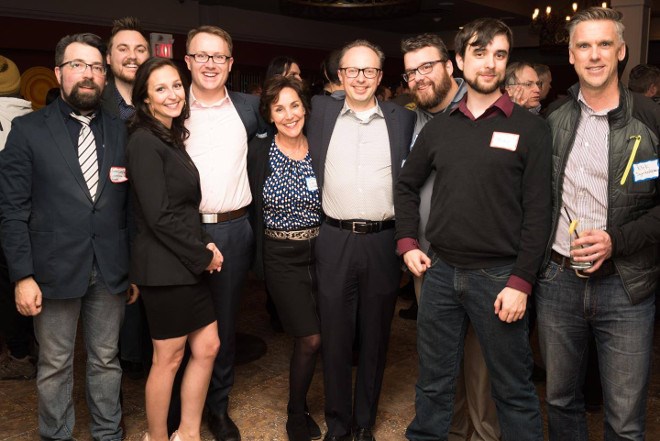Renée Higgins was on track for a career in biology until a chance discovery of the field of computer science altered the course of her future.
After signing up for an elective computer science course in university, she found she really enjoyed the challenges and rewards of coding and programming.
“I loved it because it was math with a practical, tangible outcome, and I was building algorithms and seeing something happening right away because of it,” she said. “It was so interesting to me.”
That initial interest flourished, and Higgins is now a web designer and developer for the City of Greater Sudbury.
“I wish someone had introduced the field to me sooner, because I spent a year in a field it turned out I wasn’t as passionate about,” she said. “I think if I had discovered coding at a younger age, I would have known right away.”
Educating youth about careers in the tech field is one part of the mandate of CodeOp, a new, not-for-profit Sudbury organization aimed at bringing together professionals in the city’s emerging tech sector.
Another of CodeOp’s primary goals is introducing programmers and coders to businesses seeking their expertise.
Mike Daoust, who co-chairs CodeOp, said over the last few years, the tech sector in Sudbury has grown substantially, but even people in the industry were unaware of just how many people were working in the field.
Daoust, who organizes the annual Sudbury Game Design Challenge, said he and some fellow programmers realized a forum was needed to bring together tech professionals and local business owners to explore their common interests.
“We have all these employers that are looking for these jobs, but they can’t find them,” said Daoust, lead programmer at AdvanceWorx.
“At the same time, we have these people that are looking for jobs who can’t find that employment. So it seemed to me that we needed to create some kind of bridge to connect those two spheres together.”
With technology advancing at a rapid pace, the demand for programmers and developers is increasing as companies realize they require more than just basic IT services, he said. And the need spans sectors.
Local success stories include Time Hero, Minalytix, and Symboticware.
Daoust said he believes the tech industry could be the city’s next developing cluster.
“It’s our hope to turn Sudbury into the technological hub of the North, and it’s our hope that if we’re able to do that, then we’ll see a very real cluster of developers here that merge into something that’s publicly acknowledged,” he said.
“But if it is going to happen, it’s going to be a long time coming and it’s going to involve a lot of work from the ground up.”
The organization is developing a series of workshops, geared toward high school teachers, to equip them with the resources and knowledge to teach computer science-related skills in their classrooms.
If they can foster an early appreciation for the field, then perhaps they can create a new generation of programmers and developers who might not otherwise be exposed to the industry, Daoust said.
CodeOp is additionally working closely with Laurentian University and Cambrian College.
Two years ago, Higgins got involved with the Sudbury chapter of Ladies Learning Code, a not-for-profit organization that promotes digital literacy amongst youth and women.
Workshops they’ve hosted have regularly sold out, and demand remains high.
The interest by young women, in particular, is heartening for Higgins, who was the only woman to graduate from her program out of a class of 100.
Women programmers currently only make up 20 per cent of the workforce, but Higgins believes the opportunities for work are innumerable.
“Code is the language of the future,” she said. “Everything that we use has code behind it now.”
Work in the field is varied, often very flexible, and pays well, and demand is so high that students are virtually guaranteed a job upon graduation.
“The amount of programmers required is increasing every year, but the number of graduates is remaining the same, so there’s a crisis right now in the tech sector all over the world,” Higgins said.
That need is especially high in Northern Ontario, because the bulk of graduates decamp for other regions where they think demand — and therefore opportunity — is greater.
“They think the jobs are in Toronto,” Higgins said. “It’s really important for our local businesses to be able to get that talent here in Sudbury where they understand the local environment and where they can develop partnerships with programmers.”
CodeOp is celebrating some early success. Organizers were expecting roughly 40 people to attend their first networking event in March, but instead welcomed 150 to the event. A number of programmers and businesses were introduced, which has already resulted in people finding jobs in the field.
